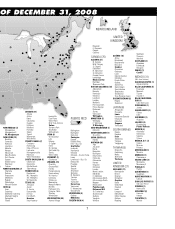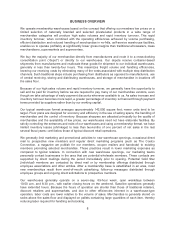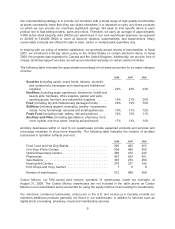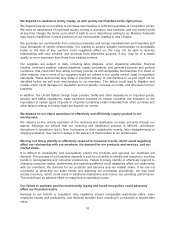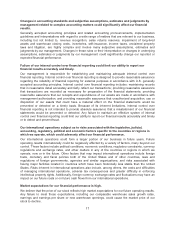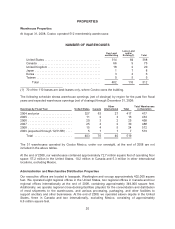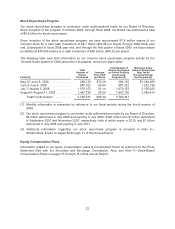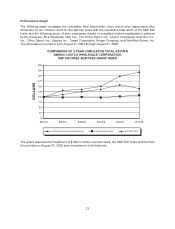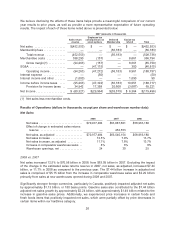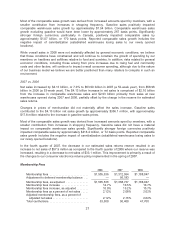Costco 2008 Annual Report Download - page 19
Download and view the complete annual report
Please find page 19 of the 2008 Costco annual report below. You can navigate through the pages in the report by either clicking on the pages listed below, or by using the keyword search tool below to find specific information within the annual report.Changes in accounting standards and subjective assumptions, estimates and judgments by
management related to complex accounting matters could significantly affect our financial
results.
Generally accepted accounting principles and related accounting pronouncements, implementation
guidelines and interpretations with regard to a wide range of matters that are relevant to our business,
including but not limited to, revenue recognition, sales returns reserves, impairment of long-lived
assets and warehouse closing costs, inventories, self-insurance, income taxes, unclaimed property
laws and litigation, are highly complex and involve many subjective assumptions, estimates and
judgments by our management. Changes in these rules or their interpretation or changes in underlying
assumptions, estimates or judgments by our management could significantly change our reported or
expected financial performance.
Failure of our internal control over financial reporting could limit our ability to report our
financial results accurately and timely.
Our management is responsible for establishing and maintaining adequate internal control over
financial reporting. Internal control over financial reporting is designed to provide reasonable assurance
regarding the reliability of financial reporting for external purposes in accordance with U.S. generally
accepted accounting principles. Internal control over financial reporting includes: maintaining records
that in reasonable detail accurately and fairly reflect our transactions; providing reasonable assurance
that transactions are recorded as necessary for preparation of the financial statements; providing
reasonable assurance that our receipts and expenditures of our assets are made in accordance with
management authorization; and providing reasonable assurance that unauthorized acquisition, use or
disposition of our assets that could have a material effect on the financial statements would be
prevented or detected on a timely basis. Because of its inherent limitations, internal control over
financial reporting is not intended to provide absolute assurance that a misstatement of our financial
statements would be prevented or detected. Any failure to maintain an effective system of internal
control over financial reporting could limit our ability to report our financial results accurately and timely
or to detect and prevent fraud.
Our international operations subject us to risks associated with the legislative, judicial,
accounting, regulatory, political and economic factors specific to the countries or regions in
which we operate, which could adversely affect our financial performance.
Our international operations could form a larger portion of our business in future years. Future
operating results internationally could be negatively affected by a variety of factors, many beyond our
control. These factors include political conditions, economic conditions, regulatory constraints, currency
regulations and exchange rates, and other matters in any of the countries or regions in which we
operate, now or in the future. Other factors that may impact international operations include foreign
trade, monetary and fiscal policies both of the United States and of other countries, laws and
regulations of foreign governments, agencies and similar organizations, and risks associated with
having major facilities located in countries which have been historically less stable than the United
States. Risks inherent in international operations also include, among others, the costs and difficulties
of managing international operations, adverse tax consequences and greater difficulty in enforcing
intellectual property rights. Additionally, foreign currency exchange rates and fluctuations may have an
impact on our future costs or on future cash flows from our international operations.
Market expectations for our financial performance is high.
We believe that the price of our stock reflects high market expectations for our future operating results.
Any failure to meet these expectations, including our comparable warehouse sales growth rates,
earnings and earnings per share or new warehouse openings, could cause the market price of our
stock to decline.
17


